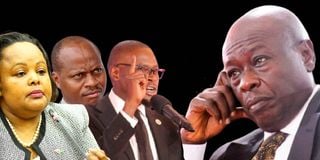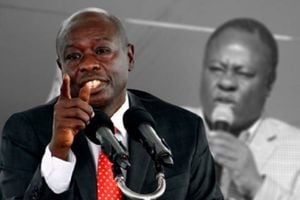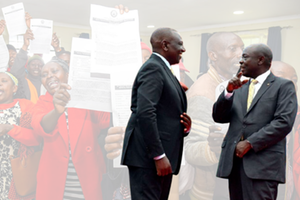
Secretary to the Cabinet Mercy Wanjau (left), former acting Kemsa chief executive Andrew Mulwa, Nairobi Governor Johnson Sakaja and Deputy President Rigathi Gachagua.
Deputy President Rigathi Gachagua is to have his day before the National Assembly today, in an unprecedented move, to defend himself against the impeachment motion by Kibwezi West MP Mwengi Mutuse.
The motion, officially notified to the members by Speaker Moses Wetang’ula on Tuesday last week, lays 11 grounds, which according to the mover, Mr Mutuse, make DP Gachagua’s continued stay in office untenable. For the House to impeach the DP, it requires just one of the 11 grounds to be substantiated, with the ultimate role to render the DP jobless resting with the Senate.
The grounds have been particularised and premised on three areas: gross violation of the Constitution; commission of crime under national or international law; and gross misconduct provided in Article 150 of the Constitution on the removal from office of the Deputy President by impeachment.
While the threshold for admitting an impeachment motion against the President or Deputy President is 117 MPs, the threshold for passing a resolution on the motion for the impeachment is 233 MPs.
DP Gachagua has lined up a team of lawyers, led by Senior Counsel Paul Muite, to defend him against the allegations and he has been allocated time in the debating chamber from 5pm to 7pm today.
In a televised address on Monday night Mr Gachagua said he had been invited to appear before the National Assembly at 5pm on Tuesday.
“I confirm I will be available to present my case for two hours,” Mr Gachagua said.
“Millions of Kenyans turned out to elect their leaders. Some 7.2 million people decided to elect President Ruto and myself. So I think it is only fair if these people hear first from me by getting my response to the outrageous allegations leveled against me,” the DP said.
Legal representation
Standing Order 67 obliges the House to afford the DP an opportunity to be heard either in person, through a representative, or both.
“The DP is entitled to appear before the House in person, through legal representation, or both during the consideration of the motion,” Mr Wetang’ula said.
He described the journey the House is required to travel in the impeachment as “unprecedented” even as he defended the MPs’ power to impeach.
“The power to impeach is a profound check on the conduct of a state officer. To safeguard the rights of the affected state office, the Constitution prescribes high and graduated thresholds on the National Assembly,” Mr Wetang’ula says.
The House will first meet in the morning today to debate the motion like any other motion before affording the DP an opportunity to defend himself, and later vote to substantiate the 11 grounds one by one or reject them all. If any one of the grounds is substantiated, the DP will stand impeached and the speaker will notify the Senate of its decision within two days.
The House is also under obligation to accord the DP the right to fair administrative action under Article 47 of the Constitution and the right to fair hearing as provided for in Article 50 of the Constitution.
In defending himself, Mr Gachagua will face his juniors in government: Secretary to the Cabinet Mercy Wanjau, Nairobi Governor Johnson Sakaja and former Kenya Medical Supplies Authority CEO Andrew Mulwa. The three, in explosive affidavits, variously accuse the DP of insincerity and coercion.
Ms Wanjau accuses the DP of opposing the decisions made by the Cabinet, of which he is a member, hence not being a person to be trusted.
Mr Sakaja accuses the DP of interfering with the mandate of Nairobi County by inciting the people through ethnic mobilisation against the decisions of the county.
Mr Mulwa blames the DP for interfering in Kemsa operations in the award of lucrative tenders.
Mr Wetang’ula notes that the threshold to impeach the DP reflects the gravity of the task before the National Assembly. Standing Order 68 provides that a motion for the removal of a person from office is a special motion and takes precedence over all other business on the Order Paper—a document that contains a schedule of business to be transacted on a daily basis. This means the consideration of the Special Motion shall have priority over all activities of the House, whether domestic or foreign.
The House Business Committee, chaired by the Speaker, made a resolution last week on Tuesday that was approved by the House to hold a morning sitting today and commence an early afternoon sitting to consider the Special Motion.
“This Special Motion is not just an inquiry into the conduct of a state officer, it is also a momentous test of the resilience of the constitutional procedures meticulously designed by the framers,” the Speaker says.
On Monday, Mr Wetang’ula reminded the House that as it proceeds to scrutinise the conduct of the DP, “the House is also under scrutiny with respect to its fidelity to the Constitution and its obligation to uphold the rights of every Kenyan.
“I have no doubt that we will rise to this defining moment, that we shall confront this test with dignity, resolve, and utmost integrity. The House shall prove itself worthy of the trust placed on it by the Constitution and the people it represents,” Mr Wetang’ula said.











